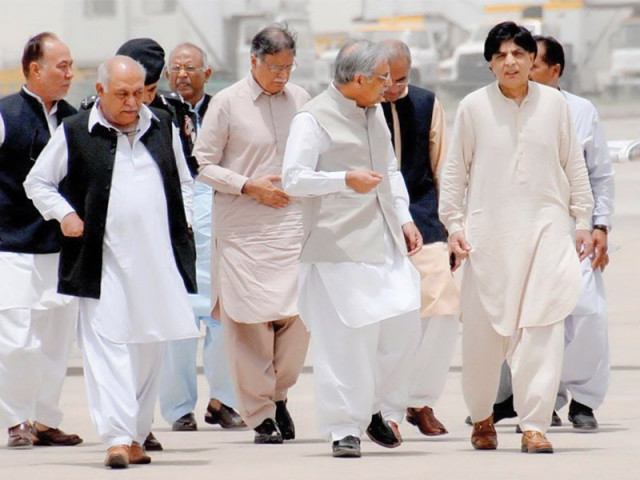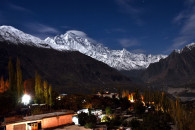Day of mourning: Female bomber struck Quetta bus
Interior minister says govt will only negotiate with those who are willing to negotiate.

Interior Minister Chaudhry Nisar along with Pervaiz Rashid and Mir Hasil Bizenjo arrive at the Quetta airport. PHOTO: ONLINE
A pall of gloom hung over the capital of Balochistan as the federal interior minister flew in to offer support to the provincial administration following Saturday’s dastardly attacks that killed over two dozen people, including 14 students of the lone women’s university of the province.
Meanwhile while sifting through the forensic evidence, investigators concluded that the blast onboard the bus carrying students from the Sardar Bahadur Khan Women’s University was a suicide attack. On Saturday, police called it a remote-controlled bomb blast.

A female suicide bomber impersonating a university student boarded the bus and detonated the explosives strapped to her body, investigators told The Express Tribune. They, however, requested not to be named in the report because they were not authorised to speak officially on the matter.
Outlawed sectarian extremist group Lashkar-e-Jhangvi (LeJ) – which has been blamed for most communal violence in the country – claimed credit for the attack. The group’s spokesperson Abu Bakar told Quetta-based journalists in a phone call that the attack was carried out by a female suicide bomber, Ayesha Siddiqa.
At least 28 people, including the deputy commissioner of Quetta, were killed in the attack on the university bus and in three subsequent suicide attacks and firing at the Bolan Medical Complex (BMC) where LeJ terrorists had taken government officials, doctors and paramedics hostage after the first attack.
The twin attacks came hours after insurgents from the banned separatist group Balochistan Liberation Army (BLA) bombed Quaid-e-Azam Muhammad Ali Jinnah’s historic residency at the scenic hill station of Ziarat.
Interior Minister Chaudhry Nisar Ali Khan, who flew into Quetta along with his cabinet colleague Information Minister Pervaiz Rashid, reviewed the security situation at a high-level meeting on Sunday. He said the provincial administration had taken ‘crucial decisions’ to deal with terrorist attacks. Once approved by Prime Minister Nawaz Sharif, the decisions would be formally announced, Nisar added.
Balochistan has been caught up in a vicious cycle of violence perpetrated by sectarian extremists, separatist insurgents and Taliban militants. A bloody separatist insurgency, which started in 2004, became deadlier following the 2006 killing of Baloch chieftain Nawab Akbar Bugti in a military operation. Subsequent efforts to win over the separatists have failed.

Nisar said restoration of peace in the country tops the priorities list of the PML-N government. “We believe all issues can be resolved through negotiations,” he said. However, he went on to add that the government “will only negotiate with those who are willing to negotiate. Those who refuse to renounce violence will be dealt with through other means.”
He announced that all those killed at BMC – including deputy commissioner Abdul Mansur Khan Kakar, FC troops, policemen, doctors and nurses – would be awarded Tamgha-i-Jurat (Medal of Courage), saying that they laid down their lives for the country.
The interior minister said he visited Balochistan on the directives of the prime minister who was saddened by the attacks in Quetta and Ziarat. “We are here to offer condolences to the bereaved families,” he said and added that the federal government would stand by the people of Balochistan in these testing times.
Meanwhile, a day of mourning was observed across Balochistan. The national flag flew half-mast atop government buildings. The provincial capital wore a deserted look as all shopping malls and businesses remained closed. Public transport stayed off the roads. Intercity bus services also remained suspended on the day of mourning.
Deputy Inspector General of Police (Operations) Fayyaz Sumbal said the police have registered cases of the Quetta and Ziarat attacks against unknown persons.
The slain deputy commissioner, Abdul Mansoor Khan Kakar, was laid to rest in the Kasi graveyard on Sunday. Top civil and military officials attended the funeral. Interior Minister Nisar, Information Minister Rashid and Chief Minister Dr Abdul Malik Baloch also visited the house of Kakar to offer condolences to his family.
Seven of the 14 students of the women’s university, who were killed in Saturday’s attack, were identified as Abida Malik, Rehana, Aurangzaib, Sonam Magsi, Noorul Ain, Shagufta Jamali, Sadaf and Atiya Bibi. The remaining bodies were charred beyond recognition and officials they would perform DNA tests for their identification.
Published in The Express Tribune, June 17th, 2013.



















COMMENTS
Comments are moderated and generally will be posted if they are on-topic and not abusive.
For more information, please see our Comments FAQ